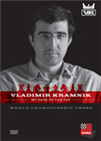Lengthy duels
Although there was only one decisive result, the weekend games in Dortmund lasted, in average, over fifty moves. That might be connected to the fact that the players, knowing the pairings in advance, prepared lines that secure small edges which require long conversions.
In the second round, two of the games coincidentally featured positions with a hard-to-evaluate material balance. Vladislav Kovalev and Vladimir Kramnik had a bishop and a rook against Ian Nepomniachtchi and Radek Wojtaszek's queens, respectively. In both cases, the side with the two pieces had dangerous passed pawns. Kovalev looked for opportunities until move 90, while Kramnik took some risks to push for a win during 47 moves.
In Kovalev's game, White had two connected passed pawns, but it was hard to mobilize them with the queen constantly threatening to give perpetual check. At some points during the struggle, the computer gave White an advantage of up to +1, but for humans to find the mathematical sequences that lead to real progress is almost impossible. Kovalev kept waiting for Nepomniachtchi to err, but the Russian showed some Soviet-school defensive technique to finally hold.
In the final position, White cannot free himself from the checks without losing the bishop.

Kovalev held in round one and pushed in round two, a good start for the newcomer | Photo: Hartmut Metz
The perennial favourite in Dortmund, Vladimir Kramnik, seems to be determined to fight for first place this year. In day one, he tried to break Nisipeanu's fortress, while against Wojtaszek, on Sunday, he chose a dangerous continuation when he could have easily gone for a quieter line:
 On this DVD Vladimir Kramnik retraces his career from talented schoolboy to World Champion in 2006. With humour and charm he describes his first successes, what it meant to be part of the Russian Gold Medal team at the Olympiad, and how he undertook the Herculean task of beating his former mentor and teacher Garry Kasparov.
On this DVD Vladimir Kramnik retraces his career from talented schoolboy to World Champion in 2006. With humour and charm he describes his first successes, what it meant to be part of the Russian Gold Medal team at the Olympiad, and how he undertook the Herculean task of beating his former mentor and teacher Garry Kasparov.
Black played 21.Qxe1?!, trusting that after 22.Qxe1 Bxd3 23.bxa5 his passed d-pawn will provide some winning chances. Wojtaszek got a passed a-pawn, but Kramnik's threat on the d-file forced him to look for perpetual checks. The players agreed to a draw in the following position:

Wojtaszek will try to repeat last year's success | Photo: Hartmut Metz
The one decisive game of the tournament was practically decided before move 20. Duda, playing Black, castled queenside and advanced his pawns on the other flank early on.
 At the airport, in the hotel or at home on your couch: with the new ChessBase you always have access to the whole ChessBase world: the new ChessBase video library, tactics server, opening training App, the live database with eight million games, Let’s Check and web access to playchess.com
At the airport, in the hotel or at home on your couch: with the new ChessBase you always have access to the whole ChessBase world: the new ChessBase video library, tactics server, opening training App, the live database with eight million games, Let’s Check and web access to playchess.com
Black is about to play g4, winning the d-pawn after the knight retreats. At this point, it was necessary for Nisipeanu to look for a quick counterattack on the queenside, with 19.b4. The German played 19.Rc3 instead, and allowed his young opponent to take the pawn in the next two moves.
Duda calmly exchanged the rooks on the f-file and provoked his opponent to resign in a hopeless position:
The young Polish player is the highest-rated junior player in the world and seems to be headed for a good result in his first supertournament. Things will get tougher soon, however, as he will face Wojtaszek and Kramnik on the two rounds that will follow the first rest day.
Georg Meier and Anish Giri played a theoretical line that quickly led to a drawn position. The most any of them spent thinking was a little over six minutes.
Monday is a rest day in Dortmund. Play resumes Tuesday with Round 3.
Standings after Round 2
Games of Round 2
Links
























